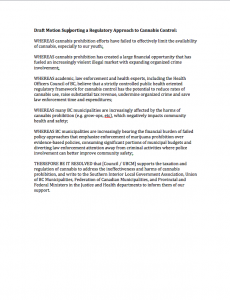
To: Prime Minister Stephen Harper and Canadian Senators
From: Louise Arbour, Richard Branson, Fernando Henrique Cardoso, Ruth Dreifuss, and Thorvald Stoltenberg,
Re: Reject mandatory minimum sentences under Bill C-10
Dear Prime Minister Harper and Canadian Senators:
We are writing to you on behalf of the Global Commission on Drug Policy, which is dedicated to reducing harms caused by drugs to people and societies. Our Commission includes global leaders such as the past presidents of Colombia and Mexico; former Secretary General of the United Nations Kofi Annan; former US Secretary of State George Schultz; and business experts such as Virgin Group founder Richard Branson and former Chairman of the US Federal Reserve Paul Volcker.
Many Global Commission members have first-hand experience with the violent illegal markets that emerge in drug-producing regions, where corruption, organized crime and violence are inevitable consequences of cannabis prohibition that cannot be successfully addressed by strengthening anti-cannabis law enforcement. We hope that Canada—where both production and consumption are an issue—remains open to new and better ideas.
Building more prisons, tried for decades in the United States under its failed War on Drugs, only deepens the drug problem and does not reduce cannabis supply or rates of use. Instead, North American youth now report easier access to cannabis than to alcohol or tobacco. And yet, today, with the proposed implementation of mandatory prison sentences for minor cannabis-related offences under Bill C-10, Canada is at the threshold of continuing to repeat the same grave mistakes as other countries, moving further down a path that has proven immensely destructive and ineffective at meeting its objectives.
As was the case with alcohol prohibition, evidence shows that increasing the intensity of drug law enforcement through mandatory minimum sentencing and other legal sanctions will not reduce the crime and violence associated with the cannabis industry. Instead, these laws will serve only to further entrench control of the cannabis market in the hands of violent criminals and waste precious tax dollars.
This has been the experience internationally. In fact, among the things that are driving organized crime and violence in British Columbia and other Canadian provinces is, although on a lesser scale, just what is driving the violence in Mexico—demand for drugs in the United States. Tougher drug laws in Canada will not address this root cause. At this late date, we hope that Canada will elect to adopt an evidence-based approach to controlling cannabis, in the face of overwhelming evidence that the proposed path through Bill C-10 is destructive, expensive and ineffective.
Debate about ending cannabis prohibition often pits those in favour of persisting with the damaging and ineffective War on Drugs against those who downplay the risks and harms of cannabis use. Canadians should take a third, evidence-based approach, which is advocated by the Global Commission and local and national organizations such as the Stop the Violence BC coalition. The Global Commission fully endorses the Stop the Violence BC coalition and its call to reduce corruption, organized crime and gang violence by taxing and regulating cannabis use under a public health framework. Indeed, the call is entirely consistent with the recommendations of our first report. Taxation and regulation models should be evaluated, as they have great potential to undermine the power of organized crime and safeguard the health and safety of Canadians. Given the experience with tobacco consumption, this approach also has the potential to actually reduce rates of cannabis use while also generating significant tax revenue.
For decades, Canadians and their leaders have embraced positive societal change and the rights of all citizens, not just in Canada but around the world. Canada has a proud international tradition of innovative and realistic policies; tougher drug law enforcement tactics such as mandatory minimum sentencing for minor drug law offences will put a huge strain on Canadian taxpayers, will not have the intended effect of creating safer communities, and will instead further entrench the marijuana industry in the hands of organized crime groups.
The clear path forward to best control cannabis in Canada and other jurisdictions throughout the world is to move away from failed law enforcement strategies and to pursue a public health approach aimed also at undermining the root causes of organized crime. Canada has the opportunity to take a leadership role in implementing such policies. And it would be completely in keeping with Canada’s global reputation as a modern, tolerant and forward-thinking nation.
Sincerely,
Louise Arbour
GCDP Commissioner
Former UN High Commissioner for Human Rights
President of the International Crisis Group, Canada
Richard Branson
GCDP Commissioner
Entrepreneur
Advocate for Social Causes
Founder of the Virgin Group
Co-founder of The Elders, UK
Fernando Henrique Cardoso
Chair, GCDP
Former President of Brazil
Ruth Dreifuss
GCDP Commissioner
Former President of Switzerland and Minister of Home Affairs
Thorvald Stoltenberg
GCDP Commissioner
Former Minister of Foreign Affairs and UN High Commissioner for Refugees, Norway
cc: Canadian Premiers and Leaders of the Opposition

 Over the last couple of months, Stop the Violence BC has been working closely with municipalities around BC to discuss and pass motions calling for the regulation and taxation of cannabis.
Over the last couple of months, Stop the Violence BC has been working closely with municipalities around BC to discuss and pass motions calling for the regulation and taxation of cannabis.
 “I am 100% behind this report, its findings and its recommendations. The carnage that has been wrought upon Mexico, its people and its institutions, through Calderón’s war on drugs, cannot be solely blamed on prohibition. However, it is my firm belief that the policies of prohibition, especially of marijuana, directly contributed to the over 47,000 people who have been killed in drug-war related violence in this country since 2007. As a former Vancouver Police officer who worked the streets of Vancouver’s Downtown East-side I was directly exposed to the multitude of victims who needlessly suffered for their addictions due to Canada´s prohibitionist stance with regards to marijuana.”
“I am 100% behind this report, its findings and its recommendations. The carnage that has been wrought upon Mexico, its people and its institutions, through Calderón’s war on drugs, cannot be solely blamed on prohibition. However, it is my firm belief that the policies of prohibition, especially of marijuana, directly contributed to the over 47,000 people who have been killed in drug-war related violence in this country since 2007. As a former Vancouver Police officer who worked the streets of Vancouver’s Downtown East-side I was directly exposed to the multitude of victims who needlessly suffered for their addictions due to Canada´s prohibitionist stance with regards to marijuana.”